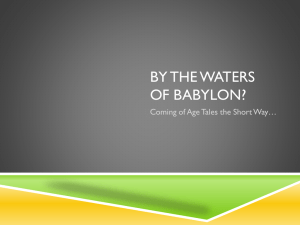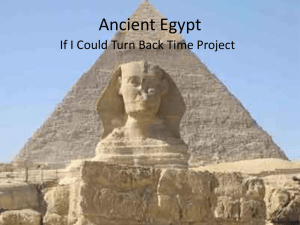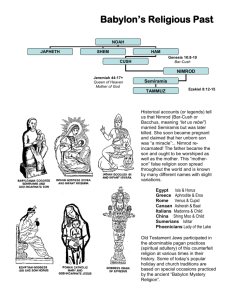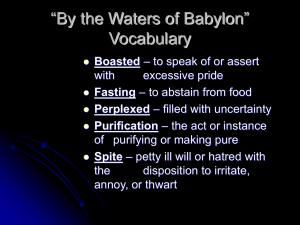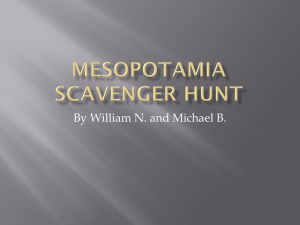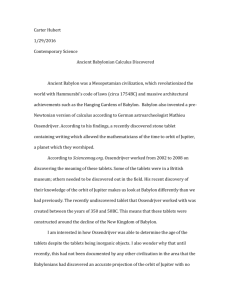Genesis 11:1-9 * The Origins of Babylon
advertisement
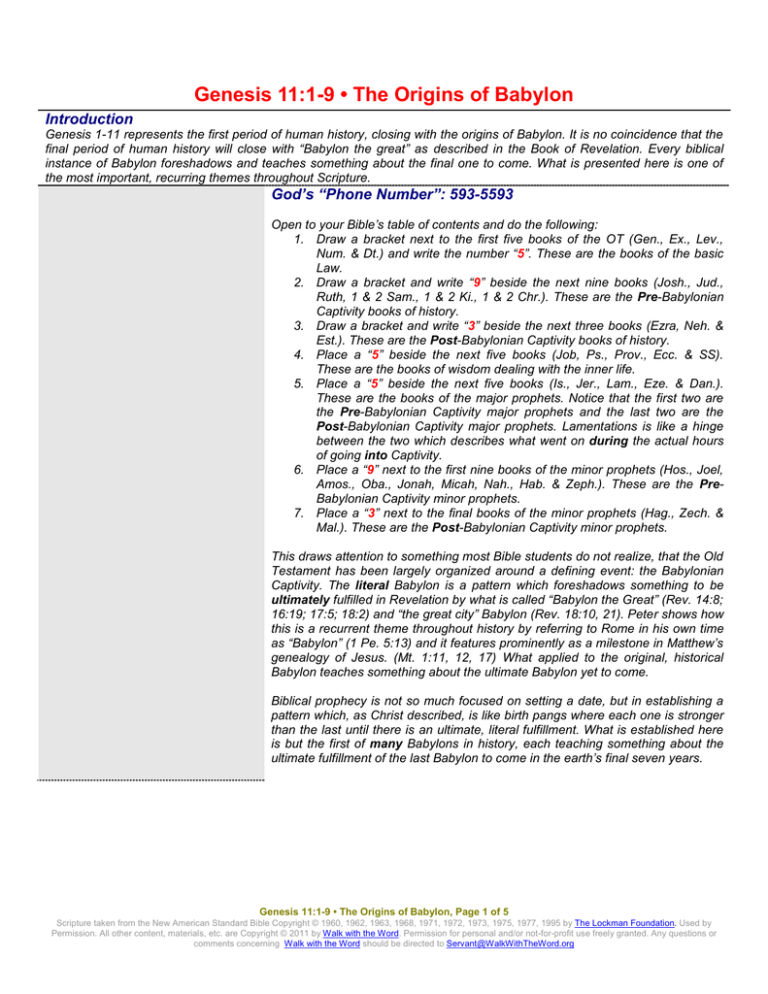
Genesis 11:1-9 • The Origins of Babylon Introduction Genesis 1-11 represents the first period of human history, closing with the origins of Babylon. It is no coincidence that the final period of human history will close with “Babylon the great” as described in the Book of Revelation. Every biblical instance of Babylon foreshadows and teaches something about the final one to come. What is presented here is one of the most important, recurring themes throughout Scripture. God’s “Phone Number”: 593-5593 Open to your Bible’s table of contents and do the following: 1. Draw a bracket next to the first five books of the OT (Gen., Ex., Lev., Num. & Dt.) and write the number “5”. These are the books of the basic Law. 2. Draw a bracket and write “9” beside the next nine books (Josh., Jud., Ruth, 1 & 2 Sam., 1 & 2 Ki., 1 & 2 Chr.). These are the Pre-Babylonian Captivity books of history. 3. Draw a bracket and write “3” beside the next three books (Ezra, Neh. & Est.). These are the Post-Babylonian Captivity books of history. 4. Place a “5” beside the next five books (Job, Ps., Prov., Ecc. & SS). These are the books of wisdom dealing with the inner life. 5. Place a “5” beside the next five books (Is., Jer., Lam., Eze. & Dan.). These are the books of the major prophets. Notice that the first two are the Pre-Babylonian Captivity major prophets and the last two are the Post-Babylonian Captivity major prophets. Lamentations is like a hinge between the two which describes what went on during the actual hours of going into Captivity. 6. Place a “9” next to the first nine books of the minor prophets (Hos., Joel, Amos., Oba., Jonah, Micah, Nah., Hab. & Zeph.). These are the PreBabylonian Captivity minor prophets. 7. Place a “3” next to the final books of the minor prophets (Hag., Zech. & Mal.). These are the Post-Babylonian Captivity minor prophets. This draws attention to something most Bible students do not realize, that the Old Testament has been largely organized around a defining event: the Babylonian Captivity. The literal Babylon is a pattern which foreshadows something to be ultimately fulfilled in Revelation by what is called “Babylon the Great” (Rev. 14:8; 16:19; 17:5; 18:2) and “the great city” Babylon (Rev. 18:10, 21). Peter shows how this is a recurrent theme throughout history by referring to Rome in his own time as “Babylon” (1 Pe. 5:13) and it features prominently as a milestone in Matthew’s genealogy of Jesus. (Mt. 1:11, 12, 17) What applied to the original, historical Babylon teaches something about the ultimate Babylon yet to come. Biblical prophecy is not so much focused on setting a date, but in establishing a pattern which, as Christ described, is like birth pangs where each one is stronger than the last until there is an ultimate, literal fulfillment. What is established here is but the first of many Babylons in history, each teaching something about the ultimate fulfillment of the last Babylon to come in the earth’s final seven years. Genesis 11:1-9 • The Origins of Babylon, Page 1 of 5 Scripture taken from the New American Standard Bible Copyright © 1960, 1962, 1963, 1968, 1971, 1972, 1973, 1975, 1977, 1995 by The Lockman Foundation. Used by Permission. All other content, materials, etc. are Copyright © 2011 by Walk with the Word. Permission for personal and/or not-for-profit use freely granted. Any questions or comments concerning Walk with the Word should be directed to Servant@WalkWithTheWord.org 1 Now the whole earth used the same language and the same words. 2It came about as they journeyed east, that they found a plain in the land of Shinar and settled there [Read v.1-2] Q: What group is specifically being looked at here? Who were they led by? Now Cush became the father of Nimrod; he became a mighty one on the earth. He was a mighty hunter before the LORD; therefore it is said, “Like Nimrod a mighty hunter before the LORD.” The beginning of his kingdom was Babel and Erech and Accad and Calneh, in the land of Shinar. From that land he went forth into Assyria, and built Nineveh and Rehoboth-Ir and Calah, and Resen between Nineveh and Calah; that is the great city. (Gen. 10:8-12) It is important to note that the label “a mighty hunter” does not precisely convey that this designation was given him for hunting people, not merely hunting for food. He is Scripture’s first ruthless dictator who turns people away from dependence on God to be dependent on him, and is also the first in Scripture to prefigure the Antichrist. “Nimrod” literally means “rebel”, indicating that he led and acted in the character of someone openly rebelling against the Word and ways of God and comes from the line of Ham which is characterized by rebellion. He not only established Babylon in the plain of Shinar, but expanded out to establish what would also become the kingdom of Assyria, two of the major empires Scripture refers to over and over again as examples of the kingdom and works of Satan and the Antichrist to come. Assyria will carry away the northern kingdom of Israel into Captivity and Babylon will carry away the southern kingdom of Judah. Q What do we know about Nimrod historically? A: Nimrod is believed to be the first king to wear a crown, claiming that it came down out of heaven. He established fire worship, idolatry and was schooled in the use of divination. Nimrod and his wife devised a religion built around “the mother child”, a satanic counterfeit of the way the Messiah would be born of a virgin and His first coming. (See The Two Babylons by Alexander Hissop for more details.) In many accounts he proclaims himself a god and is worshiped by his subjects, again a defining characteristic of a type of Antichrist. Freemasonry claims him as one of their founders. Point: What is taking place is not just a “building project” but an organized act of rebellion against God. Just as someone making a reference to “the winter at Valley Forge” is understood by all modern-day Americans or “the battle of Waterloo” by all modern-day Europeans for their greater meaning because people are familiar with the history of such places, so it was for the people given the Old Testament Scriptures. They understood the character and nature of Nimrod and the actions of his followers in direct rebellion against God. Application: The Flood may have temporarily rid the earth of sinful people but it did not remove sin. Q: Where was this “plain in the land of Shinar” located? A: It is the fertile area between the Tigris and Euphrates in what we would call modern Iraq and what would become the center of Babylon. The city of Babylon is huge, excavations of which have estimated it to be at least five and perhaps up to ten times the size of London. Q: What might be significant about it stating “they journeyed east”? Genesis 11:1-9 • The Origins of Babylon, Page 2 of 5 Scripture taken from the New American Standard Bible Copyright © 1960, 1962, 1963, 1968, 1971, 1972, 1973, 1975, 1977, 1995 by The Lockman Foundation. Used by Permission. All other content, materials, etc. are Copyright © 2011 by Walk with the Word. Permission for personal and/or not-for-profit use freely granted. Any questions or comments concerning Walk with the Word should be directed to Servant@WalkWithTheWord.org A: A viable translation of this phrase which is used in many versions (i.e., ESV, KJV, etc.) is “they journeyed from the east”. This means they turned their back on the sun (always a scriptural indication of someone in conflict with God’s will and ways), turning around from their original destination and coming back, also a scriptural picture of someone returning to their old life. Q: Why might this finding a place that looked good to them sound a little bit familiar? A: It sounds similar to the story of Lot who chose the place which pleased his eye without first inquiring of the Lord. Q: Why does Scripture say they “used the same language and the same words”? What is being conveyed by listing both the terms “language” and “words”? A: The Hebrew word here translated as “language” (saphah) is often translated throughout the OT as “lips” to convey the idea of their being the gates of speech and by extension the gates of honesty or deception, righteousness or wickedness, wisdom or folly. The Hebrew here rendered “words” (dabar) is the actual content or substance of what is spoken so as to reveal it as honesty or deception, righteousness or wickedness, wisdom or folly. What is being conveyed here is not that they were all speaking the same language mechanically, but that theologically and philosophically there ideas were all in agreement with each other. Application: Babylon is a system of government which integrates a false religious system in open rebellion to God which has at its core an Antichrist figure who demands to be worshiped in place of the One True God. They said to one another, “Come, let us make bricks and burn them thoroughly.” And they used brick for stone, and they used tar for mortar. 4They said, “Come, let us build for ourselves a city, and a tower whose top will reach into heaven, and let us make for ourselves a name, otherwise we will be scattered abroad over the face of the whole earth.” 3 [Read v.3-4] Q: What are the main goals here? A: To (1) maintain unity in opposition to God (to prevent being “scattered abroad over the face of the whole earth”), and (2) to “make for ourselves a name”. They in rebellion in the character of Nimrod their leader. Q: How do we know by their own testimony here that they are in direct rebellion against God? A: After the Flood, God commanded men to replenish the earth. And God blessed Noah and his sons and said to them, “Be fruitful and multiply, and fill the earth…As for you, be fruitful and multiply; Populate the earth abundantly and multiply in it…Now behold, I Myself do establish My covenant with you, and with your descendants after you;” (Genesis 9:1, 7, 9) Q: Why was this rebellion expressed in their decision to build a city? A: In direct contradiction to “fill the earth” they instead concentrate themselves in a single location and create something to which they will give their worship and allegiance. They believe this will prevent them from being “scattered abroad”. (v.4) Q: Why do you suppose they think this can be accomplished by building a Genesis 11:1-9 • The Origins of Babylon, Page 3 of 5 Scripture taken from the New American Standard Bible Copyright © 1960, 1962, 1963, 1968, 1971, 1972, 1973, 1975, 1977, 1995 by The Lockman Foundation. Used by Permission. All other content, materials, etc. are Copyright © 2011 by Walk with the Word. Permission for personal and/or not-for-profit use freely granted. Any questions or comments concerning Walk with the Word should be directed to Servant@WalkWithTheWord.org tower? A: One of the clues to this is provided in the description of the bricks they used, which was a process not to just make them sturdy, but waterproof. They wanted to prevent God from being able to destroy them again with a flood by erecting a structure which would withstand flooding since they have chosen a fertile plain in which to build—a place that might succumb to flooding. They think this will “make for ourselves a name” (v.4) by elevating their selves literally and spiritually. Point: Ever notice how the great cities of the world tend to build something structurally tall and appealing in order to make a name for themselves? Can you think of Paris without visualizing the Eiffel Tower, or New York city without picturing the Empire State Building, or Egypt without the pyramids? Application: Babylon is characterized by replacing God’s will and desire with man’s will and desire. 5 The LORD came down to see the city and the tower which the sons of men had built. 6The LORD said, “Behold, they are one people, and they all have the same language. And this is what they began to do, and now nothing which they purpose to do will be impossible for them. 7Come, let Us go down and there confuse their language, so that they will not understand one another’s speech.” 8So the LORD scattered them abroad from there over the face of the whole earth; and they stopped building the city. 9Therefore its name was called Babel, because there the LORD confused the language of the whole earth; and from there the LORD scattered them abroad over the face of the whole earth. [Read v.5-9] Q: What takes place according to v.7? A: This is the third conference of the Godhead recorded in Scripture. (See also Gen. 1:26, 3:22) Q: According to v. 6, what are the three conditions which characterize the rebellion taking place? 1. Unity – “…they are one people…” 2. Unlimited communications – “…they all have one language”. 3. Enough time – “…this is what they began to do…” Q: What is God’s response? A: Judgment. Q: But why is this judgment not like the Flood or Sodom and Gomorrah where God’s judgment ended life? A: In actuality this is an act of mercy because if allowed to persist in their plans, the much more terrible judgment of death would have followed. God makes it impossible for them to work together as a reminder of their need to be dependent upon Him alone and relents in bringing final judgment. Q: What does “Babel” actually mean? A: It is the Hebrew word for “gate of God”, but it sounds very similar to the Hebrew word “balal” which means “confusion”. There is a kind of wordplay here which juxtaposes what they intended—“babel” or making themselves a “gate of God”, with what God wrought—“balal” or “confusion”. Q: What is ironic about the end result? A: The first irony is that they began working toward a common goal but ended up in confusion and had to abandon their work. The second irony is that they specifically stated their original intention was to prevent being scattered abroad (v.4) which is exactly what ultimately happened to them. (v.8-9) Application: Babylon is characterized by a conscious desire to rebel against and Genesis 11:1-9 • The Origins of Babylon, Page 4 of 5 Scripture taken from the New American Standard Bible Copyright © 1960, 1962, 1963, 1968, 1971, 1972, 1973, 1975, 1977, 1995 by The Lockman Foundation. Used by Permission. All other content, materials, etc. are Copyright © 2011 by Walk with the Word. Permission for personal and/or not-for-profit use freely granted. Any questions or comments concerning Walk with the Word should be directed to Servant@WalkWithTheWord.org thwart God’s will and ways but for which the judgment of God is inescapable. Every iteration of Babylon in Scripture from Genesis to Revelation ends on the wrong side of God’s judgment. Epilog What man could not accomplish on his own would be finally achieved when he was finally in alignment with God’s will and purposes. One of the accomplishments of Pentecost was as a reversal of Babel where there was true unity among God’s people, they spoke with other languages but were understood, and their work glorified God, not men. But Babylon and its successors will come up again in Scripture. It is to Babylon that Daniel is deported, and it is here that the conquering Medes and Persians will provide the backdrop for what takes place in Esther. Nimrod as a type of the Antichrist will be replayed time and again and these kingdoms will each prefigure the final Babylon to come. In no small coincidence, the first Gulf War in 1991 ended at the time of the Jewish festival of Purim and during the same time the second Gulf War in 2003 commenced. A modern-day ruler who claimed lineage to the rulers of Babylon and whose country straddled the original location of Babylon was overthrown in the character of Babylon. But the chief characteristic of Satan is to counterfeit Christ in every way possible. This is why the character of Babylon is repeated throughout Scripture and the final fusion of a one-world government with a religious system that worships its leader is found in the final years of earth’s history in Revelation 17-18 characterized as “Babylon the great”. One of the sure signs that we are in the Last Days is found in the way that this current generation is repeating all the same conditions which were present for the very first Babel. The global economy and political situation is drawing the whole world under one, unified government again. The digital age is unifying the world under a single language again. There is only the question of whether there is enough time to accomplish the counterfeit goals of this spiritual rebellion. What took place at Babel is but a shadow of the ultimate fulfillment of what is to come. Genesis 11:1-9 • The Origins of Babylon, Page 5 of 5 Scripture taken from the New American Standard Bible Copyright © 1960, 1962, 1963, 1968, 1971, 1972, 1973, 1975, 1977, 1995 by The Lockman Foundation. Used by Permission. All other content, materials, etc. are Copyright © 2011 by Walk with the Word. Permission for personal and/or not-for-profit use freely granted. Any questions or comments concerning Walk with the Word should be directed to Servant@WalkWithTheWord.org
